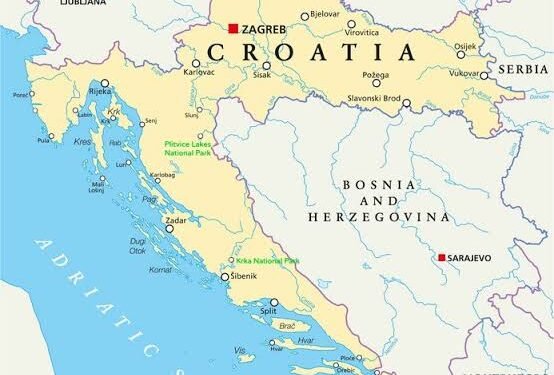Belgium, (Brussels Morning Newspaper)These are two major milestones for this small Balkan country that joined the European Union nearly a decade ago. Croatia said goodbye on Saturday at midnight (2300 GMT) to its currency, the kuna, and adopted the euro, to become the twentieth member of the euro zone .
The country joins the Schengen area of free movement, becoming at the same time the 27th State to join this vast area within which more than 400 million people can travel freely without internal border controls.
“A day for the history books”
For the government daily Vecernji List, the adoption of the euro and integration into the Schengen area is the “crowning achievement of Croatia’s accession to the European Union” (EU).
“This is the time for new beginnings, and this is the case in Croatia more than anywhere else in Europe,” tweeted European Commission chief Ursula von der Leyen as she arrived in Croatia to mark the event.
The European official met Croatian Prime Minister Andrej Plenkovic and Slovenian Head of State Natasa Pirc Musar at the border between the two countries, before going to Zagreb.
At a joint press conference at the Bregana border post, Ms von der Leyen hailed “two huge achievements” for Croatia, both achieved on the same day. “So indeed it’s a day for the history books,” she said.
In the EU since 2013
For his part, the Croatian Prime Minister declared that it was a “historic moment” because Croatia has achieved its “strategic objectives”.
Ms von der Leyen then traveled to Zagreb where she had a coffee in the Croatian capital’s central square with Croatian officials and Mr. Plenkovic, who paid the bill in euros.
Croatia, in the European Union since July 2013 , declared its independence from Yugoslavia in 1991 and the ensuing conflict (1991-1995) claimed some 20,000 lives.
Croatian leaders regularly stress the benefits that they believe their 3.9 million compatriots will derive from entering the eurozone and the Schengen area
Protect the Croatian economy
For experts, the changeover to the euro will help protect the Croatian economy, one of the weakest in the EU, in the face of galloping inflation, a serious energy crisis, and geopolitical insecurity since the beginning of the February 24 Russian invasion of Ukraine.
In the EU since 2013
For his part, the Croatian Prime Minister declared that it was a “historic moment” because Croatia has achieved its “strategic objectives”.
Ms von der Leyen then traveled to Zagreb where she had a coffee in the Croatian capital’s central square with Croatian officials and Mr. Plenkovic, who paid the bill in euros.
Croatia, in the European Union since July 2013, declared its independence from Yugoslavia in 1991 and the ensuing conflict (1991-1995) claimed some 20,000 lives.
Croatian leaders regularly stress the benefits that they believe their 3.9 million compatriots will derive from entering the eurozone and the Schengen area
“The euro brings stability and security”
In November, inflation reached 13.5% in Croatia, against 10% in the eurozone. Eastern European countries that are members of the EU but have not opted for the euro, such as Poland and Hungary, proved to be even more vulnerable to inflation.
For the governor of the Croatian central bank (National Bank of Croatia, HNB), Boris Vujcic, the abandonment of the kuna, put into circulation in 1994, is the “only reasonable policy”.
“The euro certainly brings economic stability and security”, confirmed to AFP Ana Sabic, an official of the HNB, adding that all actors in society will benefit from it.
Towards a rise in prices?
Many Croatians fear that the introduction of the euro will lead to higher prices. “It will be difficult, the prices are already high and they will go up even more,” fears Ivana Toncic, a teacher from Zagreb.
But for Marko Pavic, an employee of a tourist agency, “Croatia is joining an elite club”. And “nothing changes on January 1, everything has been calculated in euros for two decades anyway,” adds Neven Banic, another employee.
About 80% of bank deposits were already denominated in euros in Croatia, its main partners are in the eurozone and tourism, which constitutes 20% of its GDP, is supplied by a largely European clientele.




